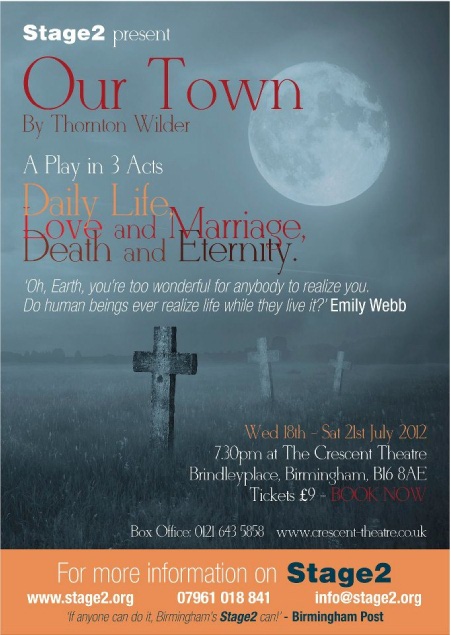Small town with a big heart

Our Town
Stage2
The Crescent Theatre
****
GROVER’S Corners, New Hampshire has seen quite a population explosion at the hands of Stage 2, who must be one of the leading youth theatres in the region, if not the country.
As usual they work on the principle that a playwright’s original cast list is merely a basis for negotiation so the role of stage manager, the narrator of Thornton Wilder’s world set in small town 1900s America, becomes four stage managers.
Then the pivotal role of Emily Webb becomes two Emilys, a young version (Ella Swarbrick) and an older Emily (Isabelle Harley), the same two for the price of one goes for her childhood sweetheart and future husband with a young George (Mark James) and older George Gibbs. (Ben Holmes).
Wilder set his Pulitzer Prize winning play in an empty theatre using only ladders, tables and chairs as props to represent a town that only existed through the characters introduced by the stage manager and the pictures drawn in the imagination of the audience.

The stage managers, Annabelle Quinin, Laura Dowsett, Teigan Jones and Colette Nooney, did well in breaking through that fourth wall and speaking directly to the audience with some nice lines in humour from time to time. They also produce all the sound effects from trains to horses, chinking milk bottles, to rain – just in case anyone has forgotten what rain sounds like.
They set the scenes but this is a play which depends heavily upon Emily, the central character through the three acts of daily life, love and marriage and death and eternity.
Ella and Isabelle do not disappoint and Isabelle in particular manages the emotional scene of being the dead Emily with some real feeling.
Indeed the women shine in this production from the bossy Rebecca Gibbs, played with real spirit by Jess Smith, to the mothers Mrs Gibbs, played in a matter of fact, motherly way by Grace Smith and across the strret there is Mrs Webb, Emily’s mother, played with all shades of maternal emotion by Elin Dowsett, last seen as Eva in Picasso’s women.
The men are perhaps a little more peripheral with Sam Hotchin playing the nice guy Dr Gibbs and Matt Childs wielding the cane to limp his way through as the editor of the Grover’s Corners Sentinel and Emily's father, Mr Webb.
Young George features heavily in their big scenes as frist his father tries to teach him about responsibility and then his future father-in-law tries to teach him about . . . who knows what in a nervous exchange on the morning of the wedding.
There are cameos from the likes of Sam Allan as Constable Warren, Luca Hoffman as Howie Newsome the milkman with his galloping horse, or at least two coconut shells, Bessie and the paperboys Joe and Si Crowell both played by Roni Mevorach and the town drunk and organist Simon Stimson played by George Bandy. Simon was to hang himself and become the misery among the dead in the cemetery although we never did find out about all the troubles he had had to put up with in his life.
He played for the choir and speaking of the choir, the scene of their practice probably did not work as intended. Using the orchestra pit and under stage area meant that most of the audience saw the odd hat and perhaps a nose, a subterranean glow and then heard unconnected voices.
The population of the town, we were told, was 2642 and director Lucy Bailey-Wright tried to come as close as she could to that with a large chorus of 22 and a cast of 25, which might not have been Thornton Wilder’s intention but he would have been delighted in getting so may people involved in his play which has become an American classic.
It was set in 1901-1913 but first performed in 1938 and Wilder managed to bring in some of the politics of a 1930s America, recovering from depression, into the plot.
He had lived in New Hampshire where the play is set, although the latitude and longitude of Grover’s Corners given in the play would actually put it in Massachusetts, and anyone who has been to the USA and experienced the delights of small town America will recognise Our Town immediately.
It is a world that has changed little a century on. They and the town of the play are a place of ordinary people and ordinary lives, of hopes and aspirations, of dreams, of growing up and growing old, life and death and . . . lots of gossip.
As a production it lacks a little pace, particularly in the second half but that should pick up as the week goes on, and some of the New Hampshire accents suffered from Continental drift but once more Stage2 showed a well drilled and well rehearsed cast – and crew – producing yet another polished performance.
With no sets, no scenery and no props we relied entirely upon the young cast to both show us and tell us all about Grover's Corners, and, as usual, Stage2 did not let us, or indeed Wilder's famous town, down. To 21-07-12.
Roger Clarke